Michael Swanwick's Blog, page 111
July 8, 2016
Coming SOON!
.

I'm prepping for MidAmeriCon II, the 2016 Worldcon in Kansas City, where (modest cough) I'm to be a guest of honor, and working on more projects simultaneously than I can keep track of. So there will be a lot of announcements over the next year or so.
Meanwhile, there are three books coming out before MidAmeriCon in various formats. They are:
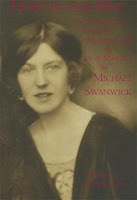 Hope-in-the-Mist
, my slim biography of Hope Mirrlees, will be published soon in e-book format. It is now available for pre-order at Weightless Books. This was a labor of love both on my part and on Henry Wessells, who published it under his Temporary Culture imprint in an edition of 200 copies. They sold out almost instantaneously and I've long wished for an ebook edition because there has been so little written about Mirrlees that any scholar wishing to write about her must read my book, it being the only biography of her in existence. Which was maddening for said scholars because it's also close to unobtainable, even via interlibrary loan.
Hope-in-the-Mist
, my slim biography of Hope Mirrlees, will be published soon in e-book format. It is now available for pre-order at Weightless Books. This was a labor of love both on my part and on Henry Wessells, who published it under his Temporary Culture imprint in an edition of 200 copies. They sold out almost instantaneously and I've long wished for an ebook edition because there has been so little written about Mirrlees that any scholar wishing to write about her must read my book, it being the only biography of her in existence. Which was maddening for said scholars because it's also close to unobtainable, even via interlibrary loan.
the part of
Now at last, it's virtually obtainable. Here.
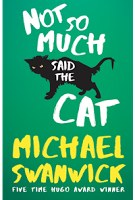 Not So Much, Said the Cat, my latest collection of short fiction, is scheduled to be published sometime this month by Tachyon Publications. If you've been following my blog, you've heard perhaps more than you wanted of the rave reviews it's been receiving. But the stories are good, I think, and the distillation of everything I've spent the past forty-some years learning.
Not So Much, Said the Cat, my latest collection of short fiction, is scheduled to be published sometime this month by Tachyon Publications. If you've been following my blog, you've heard perhaps more than you wanted of the rave reviews it's been receiving. But the stories are good, I think, and the distillation of everything I've spent the past forty-some years learning.
And:
Universe Boxes, a collaborative work by me and Dragonstairs Press nanomogul Marianne Porter. This is a strange and wonderful ultra-limited edition of thirteen unique boxes, of which ten will be available for sale. I'll be writing about this in more detail as the publication date nears, but essentially, each one consists of a) a cigar box, stamped and canceled as if it had gone through the mail and lined with star charts and paleontological photomechanical illustrations. b) various items, some (such as the bundle of business cards, common to all the boxes, others unique, c) a "vaccine," one of a series of small art objects created by Marianne Porter with select items permanently sealed inside a vaccine bottle, and d) "Universe Box," an original novelette by me in a stab-bound book with decorative papers.
The slightly blurry photo above shows the first Universe Box to be completed.
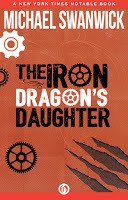 And while I'm at it...
And while I'm at it...
I should also mention that Open Road Media had made ebook versions of five of my novels and one collection available for the first time ever. They are:
Bones of the Earth
In the Drift
Jack Faust
Tales of Old Earth (the collection)
Vacuum Flowers
and, of course, The Iron Dragon's Daughter.
And now, for some reason, I feel exhausted.
*

I'm prepping for MidAmeriCon II, the 2016 Worldcon in Kansas City, where (modest cough) I'm to be a guest of honor, and working on more projects simultaneously than I can keep track of. So there will be a lot of announcements over the next year or so.
Meanwhile, there are three books coming out before MidAmeriCon in various formats. They are:
 Hope-in-the-Mist
, my slim biography of Hope Mirrlees, will be published soon in e-book format. It is now available for pre-order at Weightless Books. This was a labor of love both on my part and on Henry Wessells, who published it under his Temporary Culture imprint in an edition of 200 copies. They sold out almost instantaneously and I've long wished for an ebook edition because there has been so little written about Mirrlees that any scholar wishing to write about her must read my book, it being the only biography of her in existence. Which was maddening for said scholars because it's also close to unobtainable, even via interlibrary loan.
Hope-in-the-Mist
, my slim biography of Hope Mirrlees, will be published soon in e-book format. It is now available for pre-order at Weightless Books. This was a labor of love both on my part and on Henry Wessells, who published it under his Temporary Culture imprint in an edition of 200 copies. They sold out almost instantaneously and I've long wished for an ebook edition because there has been so little written about Mirrlees that any scholar wishing to write about her must read my book, it being the only biography of her in existence. Which was maddening for said scholars because it's also close to unobtainable, even via interlibrary loan.the part of
Now at last, it's virtually obtainable. Here.
 Not So Much, Said the Cat, my latest collection of short fiction, is scheduled to be published sometime this month by Tachyon Publications. If you've been following my blog, you've heard perhaps more than you wanted of the rave reviews it's been receiving. But the stories are good, I think, and the distillation of everything I've spent the past forty-some years learning.
Not So Much, Said the Cat, my latest collection of short fiction, is scheduled to be published sometime this month by Tachyon Publications. If you've been following my blog, you've heard perhaps more than you wanted of the rave reviews it's been receiving. But the stories are good, I think, and the distillation of everything I've spent the past forty-some years learning.And:
Universe Boxes, a collaborative work by me and Dragonstairs Press nanomogul Marianne Porter. This is a strange and wonderful ultra-limited edition of thirteen unique boxes, of which ten will be available for sale. I'll be writing about this in more detail as the publication date nears, but essentially, each one consists of a) a cigar box, stamped and canceled as if it had gone through the mail and lined with star charts and paleontological photomechanical illustrations. b) various items, some (such as the bundle of business cards, common to all the boxes, others unique, c) a "vaccine," one of a series of small art objects created by Marianne Porter with select items permanently sealed inside a vaccine bottle, and d) "Universe Box," an original novelette by me in a stab-bound book with decorative papers.
The slightly blurry photo above shows the first Universe Box to be completed.
 And while I'm at it...
And while I'm at it...I should also mention that Open Road Media had made ebook versions of five of my novels and one collection available for the first time ever. They are:
Bones of the Earth
In the Drift
Jack Faust
Tales of Old Earth (the collection)
Vacuum Flowers
and, of course, The Iron Dragon's Daughter.
And now, for some reason, I feel exhausted.
*
Published on July 08, 2016 08:17
July 6, 2016
The Man With The Write Stuff
.
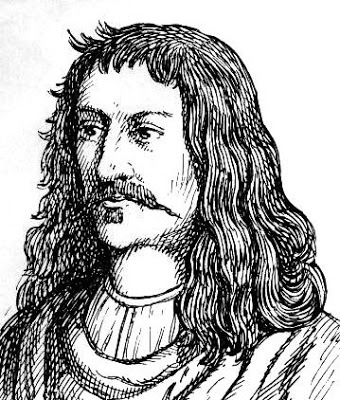
A while back, I wrote a story called "Goblin Lake," which was in part a metafiction based on several chapters of Simplicius Simplicissimus , by Hans Jakob Christoffel Von Grimmelshausen.
Okay, I hear you saying, Hans Jakob What?
Good question. During the Thirty Years War, a troop of Hessian soldiers rolled up to a farm and confiscated food, horses -- and a ten year old boy for a servant. He grew up in the military, became a soldier, and, upon the end of the war, got a job managing the estate of his former CO.
The quintessential self-made man and a born writer to boot, Von Grimmelshausen (a nom de plume and the anagram of the name of his master's estate; we have no idea what his real name was) wrote a picaresque novel about a simple peasant boy, raised by a monk, who becomes a soldier, a doctor, a courtier, a lover, and pretty much everything else a man of his times could become. It is great fun, occasionally scatological, and, not surprisingly, it became a best seller.
Those who know something about Seventeenth-Century literature can see the next part coming. Somebody pirated the book and added new chapters, thus killing the market for the original book.
Did Von Grimmelshausen get angry? Did he get even? No. The man was, as I said, a born writer. The real thing. He had the Write Stuff.
He added another ten chapters to the end of the pirated edition, kept the material written by whoever had stolen his work, and published the end-result as his own.
He was, and remains, an inspiration for us all.
*

A while back, I wrote a story called "Goblin Lake," which was in part a metafiction based on several chapters of Simplicius Simplicissimus , by Hans Jakob Christoffel Von Grimmelshausen.
Okay, I hear you saying, Hans Jakob What?
Good question. During the Thirty Years War, a troop of Hessian soldiers rolled up to a farm and confiscated food, horses -- and a ten year old boy for a servant. He grew up in the military, became a soldier, and, upon the end of the war, got a job managing the estate of his former CO.
The quintessential self-made man and a born writer to boot, Von Grimmelshausen (a nom de plume and the anagram of the name of his master's estate; we have no idea what his real name was) wrote a picaresque novel about a simple peasant boy, raised by a monk, who becomes a soldier, a doctor, a courtier, a lover, and pretty much everything else a man of his times could become. It is great fun, occasionally scatological, and, not surprisingly, it became a best seller.
Those who know something about Seventeenth-Century literature can see the next part coming. Somebody pirated the book and added new chapters, thus killing the market for the original book.
Did Von Grimmelshausen get angry? Did he get even? No. The man was, as I said, a born writer. The real thing. He had the Write Stuff.
He added another ten chapters to the end of the pirated edition, kept the material written by whoever had stolen his work, and published the end-result as his own.
He was, and remains, an inspiration for us all.
*
Published on July 06, 2016 00:30
July 5, 2016
The Iron Dragon's Daughter E-Book For Two Bucks -- But Only Today!
.
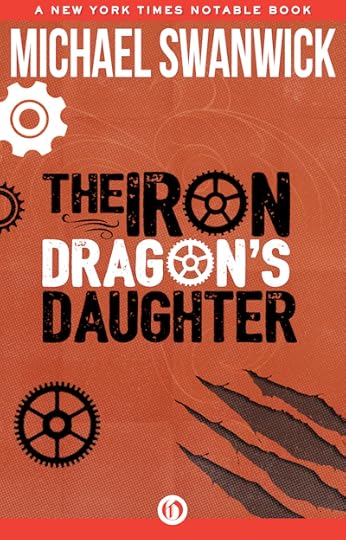
This just came into my mailbox from Open Road Media:
I'm delighted to share with you that THE IRON DRAGON'S DAUGHTER will be featured in the Early Bird Books newsletter today, July 5.
Early Bird Books is a daily deals newsletter that goes out to more than 415,000 subscribers.
TIDD will be downpriced at $1.99 for today only. The discount will be available at all major etailers, but we'd love to have as
many people as possible sign up for Early Bird Books so that they'll be aware of our many excellent authors and titles.
Please feel free to share the sign-up URL with your fans: http://www.earlybirdbooks.com/
And we encourage you to post the special pricing news today via your social channels. On the day of the promo, you may point readers to the catalog page on our Open Road website: http://www.openroadmedia.com/ebook/the-iron-dragon-s-daughter/
Over the years, a lot of readers have asked when The Iron Dragon's Daughter would be available in ebook format. Well... it's real, it's a deal, and don't get used to it. The very cheap price goes away tomorrow.
Oh, and there's a page that also includes other fantasy novels that you may very much want to buy at $1.99. You can find it here.
*

This just came into my mailbox from Open Road Media:
I'm delighted to share with you that THE IRON DRAGON'S DAUGHTER will be featured in the Early Bird Books newsletter today, July 5.
Early Bird Books is a daily deals newsletter that goes out to more than 415,000 subscribers.
TIDD will be downpriced at $1.99 for today only. The discount will be available at all major etailers, but we'd love to have as
many people as possible sign up for Early Bird Books so that they'll be aware of our many excellent authors and titles.
Please feel free to share the sign-up URL with your fans: http://www.earlybirdbooks.com/
And we encourage you to post the special pricing news today via your social channels. On the day of the promo, you may point readers to the catalog page on our Open Road website: http://www.openroadmedia.com/ebook/the-iron-dragon-s-daughter/
Over the years, a lot of readers have asked when The Iron Dragon's Daughter would be available in ebook format. Well... it's real, it's a deal, and don't get used to it. The very cheap price goes away tomorrow.
Oh, and there's a page that also includes other fantasy novels that you may very much want to buy at $1.99. You can find it here.
*
Published on July 05, 2016 08:57
July 4, 2016
Night Thoughts in the Thurber House
.

Garrison Keillor has retired from radio. Saturday was his final performance. I'm far from the only person who's going to miss that astonishing voice of his and, in particular, the News from Lake Wobegon.
They're going to try to keep the A Prairie Home Companion going, but I doubt it will work. Most likely, they'll try to turn it into a musical variety show, which is something it never was. It was two-hour festival of storytelling with occasional music. And it was powered by the fact that Keillor was -- is -- one of the greatest short fiction writers of the past fifty years.
I don't think this will be obvious until somebody combs through the collected NFLW and his prolific other writings and assembles a Best of Garrison Keillor . But the man was one of the great American short fiction writers and one of the great American humorists.
That and a hit radio show will make you a decent living.
A couple of years ago, I went to a writing event in the Mark Twain House in Hartford, Connecticut. Picture a library full of introverts tapping away at their laptops or scribbling on pads of paper. I began a lot of stories there and finished six, which I published in the New York Review of Science Fiction. One of them, set in the house of yet another important writer, was written in praise of Keillor. I present it below.
Vaya con dios, sir. You are one of the ornaments of American literature.
Night Thoughts in the Thurber House
James Thurber’s childhood home in Columbus had the rare fortune to be preserved as a museum and literary center. In consequence of which, twice a year it hosted a writer-in-residence who was housed in a furnished third-floor room and given the gift of time to work on his or her craft. That room, the very one from which Thurber’s grandfather (as described in My Life and Hard Times) threw shoes down the stairway to frighten away ghosts, subsequently knew many distinguished writers. But possibly the most honored and certainly the most frequent of these guests was Garrison Keillor. One night, the first night of his third residency, Keillor was visited by the ghost of Mark Twain. He’d been lying abed, unable to sleep, thinking of the fate of literary humorists in America. So many of the greats were completely forgotten! Thurber himself grew year by year less well known, less beloved, though his prose was still as fresh as the day it was written. It was a sobering subject for a man who was known and beloved as a humorist himself, and the occasion for many dark thoughts. A sudden chuckle, close at hand, brought Keillor bolt upright in the bed. Whipping his head to one side, he saw a ghostly pallor in the form of a whiskered gent in a white suit. He recognized the apparition immediately – who would not? – as Samuel Clemens, the man who wrote under the pseudonym of Mark Twain. “You’re working yourself into a sweat, old hoss,” the revenant said genially, “and all to no purpose.” Keillor, who had in his time read many fictional accounts of such confrontations with the illustrious dead, knew that this sort of visitation traditionally brought comfort and solace to those on the receiving end. So, feeling encouraged, he said, “You mean because my posthumous reputation is secure?” Mark Twain laughed. “I mean no such thing. No, the intent of my words is exactly the opposite. You might as well stop worrying because the fame you want is simply not yours to be had.” He produced a cigar out of nowhere and sucked on it complacently. “The public mind is small, you see, and has just enough room in it for one humorist. Which position I’ve got pretty solidly nailed down. Not just by my works, mind you, but also by my personality, which is so damnably if undeservedly loveable as to be unassailable. So you see, you might as well stop worrying about your place in literary history. It’s already occupied.” “Surely there’s room for two,” Keillor said pleadingly. The spirit shook his snow-white locks. “How did that moving picture show put it? ‘There can be only one.’ I took out Bret Harte, and I knocked down Jim Thurber, and I reckon I can settle for you as well.” So saying, the phantom faded away. After that, there was no possibility of sleep. Keillor got up, got dressed, and sat down to write. “You bastard,” he said. “I’ll get you.”
And he began to compose the most heartwarming story about Mark Twain anybody had ever written.
-
Copyright 2014 by Michael Swanwick. This story first appeared in the New York Review of Science Fiction.
*

Garrison Keillor has retired from radio. Saturday was his final performance. I'm far from the only person who's going to miss that astonishing voice of his and, in particular, the News from Lake Wobegon.
They're going to try to keep the A Prairie Home Companion going, but I doubt it will work. Most likely, they'll try to turn it into a musical variety show, which is something it never was. It was two-hour festival of storytelling with occasional music. And it was powered by the fact that Keillor was -- is -- one of the greatest short fiction writers of the past fifty years.
I don't think this will be obvious until somebody combs through the collected NFLW and his prolific other writings and assembles a Best of Garrison Keillor . But the man was one of the great American short fiction writers and one of the great American humorists.
That and a hit radio show will make you a decent living.
A couple of years ago, I went to a writing event in the Mark Twain House in Hartford, Connecticut. Picture a library full of introverts tapping away at their laptops or scribbling on pads of paper. I began a lot of stories there and finished six, which I published in the New York Review of Science Fiction. One of them, set in the house of yet another important writer, was written in praise of Keillor. I present it below.
Vaya con dios, sir. You are one of the ornaments of American literature.
Night Thoughts in the Thurber House
James Thurber’s childhood home in Columbus had the rare fortune to be preserved as a museum and literary center. In consequence of which, twice a year it hosted a writer-in-residence who was housed in a furnished third-floor room and given the gift of time to work on his or her craft. That room, the very one from which Thurber’s grandfather (as described in My Life and Hard Times) threw shoes down the stairway to frighten away ghosts, subsequently knew many distinguished writers. But possibly the most honored and certainly the most frequent of these guests was Garrison Keillor. One night, the first night of his third residency, Keillor was visited by the ghost of Mark Twain. He’d been lying abed, unable to sleep, thinking of the fate of literary humorists in America. So many of the greats were completely forgotten! Thurber himself grew year by year less well known, less beloved, though his prose was still as fresh as the day it was written. It was a sobering subject for a man who was known and beloved as a humorist himself, and the occasion for many dark thoughts. A sudden chuckle, close at hand, brought Keillor bolt upright in the bed. Whipping his head to one side, he saw a ghostly pallor in the form of a whiskered gent in a white suit. He recognized the apparition immediately – who would not? – as Samuel Clemens, the man who wrote under the pseudonym of Mark Twain. “You’re working yourself into a sweat, old hoss,” the revenant said genially, “and all to no purpose.” Keillor, who had in his time read many fictional accounts of such confrontations with the illustrious dead, knew that this sort of visitation traditionally brought comfort and solace to those on the receiving end. So, feeling encouraged, he said, “You mean because my posthumous reputation is secure?” Mark Twain laughed. “I mean no such thing. No, the intent of my words is exactly the opposite. You might as well stop worrying because the fame you want is simply not yours to be had.” He produced a cigar out of nowhere and sucked on it complacently. “The public mind is small, you see, and has just enough room in it for one humorist. Which position I’ve got pretty solidly nailed down. Not just by my works, mind you, but also by my personality, which is so damnably if undeservedly loveable as to be unassailable. So you see, you might as well stop worrying about your place in literary history. It’s already occupied.” “Surely there’s room for two,” Keillor said pleadingly. The spirit shook his snow-white locks. “How did that moving picture show put it? ‘There can be only one.’ I took out Bret Harte, and I knocked down Jim Thurber, and I reckon I can settle for you as well.” So saying, the phantom faded away. After that, there was no possibility of sleep. Keillor got up, got dressed, and sat down to write. “You bastard,” he said. “I’ll get you.”
And he began to compose the most heartwarming story about Mark Twain anybody had ever written.
-
Copyright 2014 by Michael Swanwick. This story first appeared in the New York Review of Science Fiction.
*
Published on July 04, 2016 06:46
July 1, 2016
Me! Me! Wonderful Me!
.

I'm in print again! The very fine Polish magazine Nowa Fantasyka has just published the translated version of From Babel's Fall'n Glory We Fled as "A za nami ginęła chwała Babel." Alas, as so frequently happens the "word snowflakes" that Uncle Vanya speaks in when he's not employing pidgin were left-justified rather than center-justified, so all the hard work I put in making the structure reflect a trust-based logic was for naught.
But that cannot dim my joy. Poland is a beautiful country and has long been an intellectual center of Europe. So I feel a particular thrill when one of my stories is published there.
And on the self-promotional front...
Reviews for my forthcoming collection (by golly, this month, I believe!) Not So Much, Said the Cat keep pouring in. I've told you about the starred Kirkus review and the starred Publishers Weekly review. Here's a sampling of what's being said elsewhere:
So I am feeling particularly happy these days.
That's all for today. Have a safe and joyous Fourth of July, whether you celebrate it or not.
*

I'm in print again! The very fine Polish magazine Nowa Fantasyka has just published the translated version of From Babel's Fall'n Glory We Fled as "A za nami ginęła chwała Babel." Alas, as so frequently happens the "word snowflakes" that Uncle Vanya speaks in when he's not employing pidgin were left-justified rather than center-justified, so all the hard work I put in making the structure reflect a trust-based logic was for naught.
But that cannot dim my joy. Poland is a beautiful country and has long been an intellectual center of Europe. So I feel a particular thrill when one of my stories is published there.
And on the self-promotional front...
Reviews for my forthcoming collection (by golly, this month, I believe!) Not So Much, Said the Cat keep pouring in. I've told you about the starred Kirkus review and the starred Publishers Weekly review. Here's a sampling of what's being said elsewhere:
“A whirlwind of stories that take you across the world, through different pockets of time, and into a sample of the lives being lived, Not So Much, Said the Cat is an excellent compilation. Swanwick’s latest book is a delight to read, both entertaining and insightful.”
—Pooled Ink
“I fell head-over-heels in love with this collection of stories.” —Lipstick and Libraries “Half Neil Gaiman, half Kelly Link, wonderfully unique.”
-- Johann Thorsson, Book Riot
“His writing is flawless and creative, his characters incredibly well-developed for short stories, and the descriptive nature of his text can make you feel as if you’re living in these other worlds right along with the characters. Mr. Swanwick’s readers (and many critics) have gone so far as to call him the ‘god’ of the science fiction world.”
-- Heather Fazio, Times Union
So I am feeling particularly happy these days.
That's all for today. Have a safe and joyous Fourth of July, whether you celebrate it or not.
*
Published on July 01, 2016 07:53
June 29, 2016
To Fund The Autumnal City
.
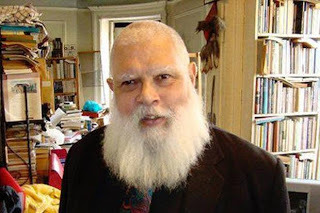
Over at Indiegogo, Kenneth James is raising money to fund the journals of Samuel R. Delany. Chip is not only one of the most significant writers of modern science fiction, second in his influence only to Robert A. Heinlein, and he had the rare good fortune of being recognized as an important writer at a very early age. So his papers have been carefully conserved.
In all, there will be at least five volumes. Volume one, In Search of Silence, is already complete and will be published by Wesleyan University Press at the end of the year. It cover's Delany's teenage years through the end of the Sixties,when he established himself as an important writer. Volume two, Autumnal City, covers the Seventies, the era of Dahlgren, Trouble on Titan, and Tales of Nevèrÿon.
If you're feeling like a patron of the literary arts, you could scarcely sink your money into a more worthy cause. Also, these are books I want to read.
You can find the Indiegogo page, with tons and tons of info, here.
*

Over at Indiegogo, Kenneth James is raising money to fund the journals of Samuel R. Delany. Chip is not only one of the most significant writers of modern science fiction, second in his influence only to Robert A. Heinlein, and he had the rare good fortune of being recognized as an important writer at a very early age. So his papers have been carefully conserved.
In all, there will be at least five volumes. Volume one, In Search of Silence, is already complete and will be published by Wesleyan University Press at the end of the year. It cover's Delany's teenage years through the end of the Sixties,when he established himself as an important writer. Volume two, Autumnal City, covers the Seventies, the era of Dahlgren, Trouble on Titan, and Tales of Nevèrÿon.
If you're feeling like a patron of the literary arts, you could scarcely sink your money into a more worthy cause. Also, these are books I want to read.
You can find the Indiegogo page, with tons and tons of info, here.
*
Published on June 29, 2016 07:44
June 28, 2016
Good News For Everyone Who Happens To Be Me!
.
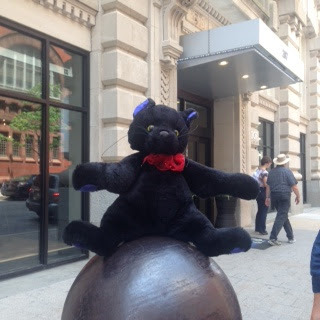
I got a starred review from Publishers Weekly ! Or, rather, my upcoming Tachyon Publications collection Not So Much, Said the Cat got a starred review.
For a writer, this is a big deal, so I'm extremely happy about it.
Here it is in its entirety:
And here's the blurb that will most likely go on the book:
And I should explain . . .
Actually, "From Babel's Fall'n Glory We Fled" didn't win a Hugo. It was nominated but lost to Ted Chiang's story, "Exhalation." Over the years, I'd had remarkably good fortune in the stories I've lost to. Octavia Butler's "Blood Child" was another one I wasn't embarrassed to lose to.
And I should also apologize . . .
No, I didn't manage to blog yesterday. Mea culpa. It's summer and it's hot and I was lazy. I'll do my very best to get back on schedule tomorrow.
Above: "It's da bomb!" says Beelzebub, the promotional cat. Shown here in Baltimore sitting atop an unexploded shell that fell into Fort McHenry during the Battle of Baltimore in 1814.
*

I got a starred review from Publishers Weekly ! Or, rather, my upcoming Tachyon Publications collection Not So Much, Said the Cat got a starred review.
For a writer, this is a big deal, so I'm extremely happy about it.
Here it is in its entirety:
Multiple Hugo Award–winner Swanwick (Chasing the Phoenix) returns with this superb collection of stories published between 2008 and 2014. Ranging across the various subgenres of fantasy and science fiction, the volume includes the Hugo-winning “From Babel’s Fall’n Glory We Fled...,” in which a space suit AI narrates how its owner escaped from a conquered alien metropolis with a burden of incalculable value. Other stories of note are “The Man in Grey,” whose title character is one of reality’s stage managers, in charge of making sure that the props and sets are in place for the 50,000 people who really exist in our universe, all others being mere illusion; “Tawny Petticoats,” in which swindlers Darger and Surplus are taken in by the dauntingly beautiful title character; and “The She-Wolf’s Hidden Grin,” in which two poor little rich girls living on a grim colonial world discover their true alien heritage. Each of these 17 stories is a gem, beautifully written, expertly plotted, with brilliantly developed characters. This is as good as short speculative fiction gets.
And here's the blurb that will most likely go on the book:
Each of these 17 stories is a gem, beautifully written, expertly plotted, with brilliantly developed characters. This is as good as short speculative fiction gets.-- Publishers Weekly (starred review)So, yes, I am very, very happy about this.
And I should explain . . .
Actually, "From Babel's Fall'n Glory We Fled" didn't win a Hugo. It was nominated but lost to Ted Chiang's story, "Exhalation." Over the years, I'd had remarkably good fortune in the stories I've lost to. Octavia Butler's "Blood Child" was another one I wasn't embarrassed to lose to.
And I should also apologize . . .
No, I didn't manage to blog yesterday. Mea culpa. It's summer and it's hot and I was lazy. I'll do my very best to get back on schedule tomorrow.
Above: "It's da bomb!" says Beelzebub, the promotional cat. Shown here in Baltimore sitting atop an unexploded shell that fell into Fort McHenry during the Battle of Baltimore in 1814.
*
Published on June 28, 2016 10:46
June 23, 2016
The Day Lafferty Autographed My Book Twice
.
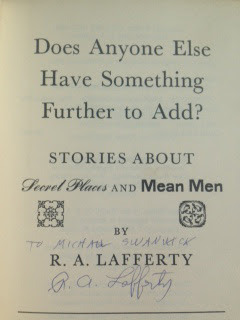
Yesterday, Andrew Mass came to the house to interview me for a documentary film he's making about R. A. Lafferty. It went well, I think. But afterward, it occurred to me that I had one small story about Lafferty that I've never committed to print. So here it is.
Forty years ago, I attended my first Worldcon -- MidAmeriCon in Kansas City. Where my motley crew of friends brought things like electric guitars and amps, the Starship Troopers war game, an industrial laser, and so on, I carried with me a single book, a hardcover of Lafferty's Does Anyone Else Have Anything Further to Add? Of all the writers present (pretty much everyone in the SF world), his was the autograph I most desired.

I must have been ignorant of the fact that there were scheduled autograph sessions because i carried the book around with me, hoping I would see the man. And I did! He was talking to Silverberg or Asimov or some other giant of the field, so I stood nearby and in a break in the conversation asked if he would sign my book.
Lafferty took the book, flipped to the title page, then flipped two pages back and signed the blank end-paer. I thanked the man and floated away.
A couple of my friends were nearby and, laughing, took the book from me and opened it to the title page. There was Lafferty's autograph a second time, inscribed to me. It was a surreal moment.
My friends, it turned out, had earlier taken my book while I was sleeping, gotten the autograph, and then not told me. As a practical joke, you see. But it hadn't quite worked out the way they'd thought it would because, on seeing his signature, Lafferty had simply found another page to sign.
It was a kindly act, not calling me out for asking him to sign a book that was already signed. Lafferty was a true gent.

Immediately above: R. A. Lafferty's second autograph.
*

Yesterday, Andrew Mass came to the house to interview me for a documentary film he's making about R. A. Lafferty. It went well, I think. But afterward, it occurred to me that I had one small story about Lafferty that I've never committed to print. So here it is.
Forty years ago, I attended my first Worldcon -- MidAmeriCon in Kansas City. Where my motley crew of friends brought things like electric guitars and amps, the Starship Troopers war game, an industrial laser, and so on, I carried with me a single book, a hardcover of Lafferty's Does Anyone Else Have Anything Further to Add? Of all the writers present (pretty much everyone in the SF world), his was the autograph I most desired.

I must have been ignorant of the fact that there were scheduled autograph sessions because i carried the book around with me, hoping I would see the man. And I did! He was talking to Silverberg or Asimov or some other giant of the field, so I stood nearby and in a break in the conversation asked if he would sign my book.
Lafferty took the book, flipped to the title page, then flipped two pages back and signed the blank end-paer. I thanked the man and floated away.
A couple of my friends were nearby and, laughing, took the book from me and opened it to the title page. There was Lafferty's autograph a second time, inscribed to me. It was a surreal moment.
My friends, it turned out, had earlier taken my book while I was sleeping, gotten the autograph, and then not told me. As a practical joke, you see. But it hadn't quite worked out the way they'd thought it would because, on seeing his signature, Lafferty had simply found another page to sign.
It was a kindly act, not calling me out for asking him to sign a book that was already signed. Lafferty was a true gent.

Immediately above: R. A. Lafferty's second autograph.
*
Published on June 23, 2016 07:53
June 20, 2016
It's A Wonderful Life
.
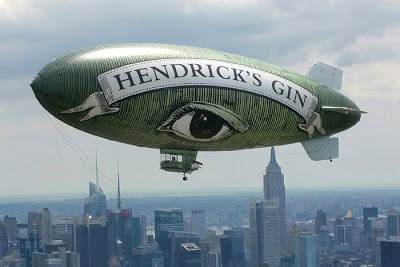
What an astonishing world we live in! The Hendricks Gin Blimp just flew over our neighborhood. It's emblazoned with the name of the product and the all-seeing eye of the Illuminati.
The American Martini Laboratory has tested Hendricks and ruled that it is not a great Martini gin. But it is miraculously good in a gin-and-tonic. So it looks like we'll be having gin-and-tonics at the cocktail hour tonight.
Above: My phone camera doesn't have the resolution, so I swiped this image from the Web. You can find the original at: http://www.bizbash.com/hendricks-air-...
.

What an astonishing world we live in! The Hendricks Gin Blimp just flew over our neighborhood. It's emblazoned with the name of the product and the all-seeing eye of the Illuminati.
The American Martini Laboratory has tested Hendricks and ruled that it is not a great Martini gin. But it is miraculously good in a gin-and-tonic. So it looks like we'll be having gin-and-tonics at the cocktail hour tonight.
Above: My phone camera doesn't have the resolution, so I swiped this image from the Web. You can find the original at: http://www.bizbash.com/hendricks-air-...
.
Published on June 20, 2016 13:09
June 17, 2016
Introducing Liu Cixin
.
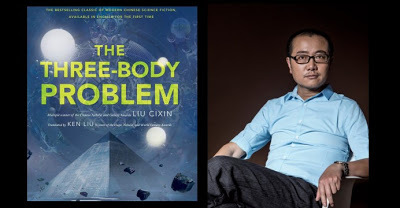
The industrious Carl Slaughter has published an interview with Chinese SF superstar Liu Cixin (or, as his name is rendered in English translation, Cixin Liu) over in File 770 . It is emblematic of how difficult it is for Americans to receive news of overseas SF that this interview took two long years, several intermediaries and more than one translator to get here. (The current version is by, one almost says "of course," Ken Liu, whose translations have become the gold standard for Chinese SF.)
Liu Cixin is best known for The Three-Body Problem , volume one of a hard-SF trilogy of the same name, which was the first science fiction novel to become a mainstream best-seller in China, and the first translated work to the the Hugo Award. More significant, I feel, is the fact that his fellow science fiction writers in China are in awe of his work. I'm a big fan of this guy.
Here's an excerpt from the interview:
You can read the entire interview here.
*

The industrious Carl Slaughter has published an interview with Chinese SF superstar Liu Cixin (or, as his name is rendered in English translation, Cixin Liu) over in File 770 . It is emblematic of how difficult it is for Americans to receive news of overseas SF that this interview took two long years, several intermediaries and more than one translator to get here. (The current version is by, one almost says "of course," Ken Liu, whose translations have become the gold standard for Chinese SF.)
Liu Cixin is best known for The Three-Body Problem , volume one of a hard-SF trilogy of the same name, which was the first science fiction novel to become a mainstream best-seller in China, and the first translated work to the the Hugo Award. More significant, I feel, is the fact that his fellow science fiction writers in China are in awe of his work. I'm a big fan of this guy.
Here's an excerpt from the interview:
Since the 80s, China has been introduced to a large amount of foreign (mainly English) science fiction. Some influential American science fiction has been translated and published in China. The publication cycle has been greatly shortened. For example, when stories win a Hugo/Nebula, they are soon after published in China. Foreign publishing in China is still in infancy and quantity is tiny. “The Three Body Problem” is the only Chinese science fiction novel published in English. It won a Hugo. Some Chinese writers have appeared in western magazines and websites. There are 2 Chinese writers published in Nature. In my opinion, science fiction is the most global literature because it deals with issues relevant to all races. So I prefer English speaking science fiction fans read my novel because it’s science fiction, not because it’s “Chinese” science fiction.
You can read the entire interview here.
*
Published on June 17, 2016 00:30
Michael Swanwick's Blog
- Michael Swanwick's profile
- 546 followers
Michael Swanwick isn't a Goodreads Author
(yet),
but they
do have a blog,
so here are some recent posts imported from
their feed.



